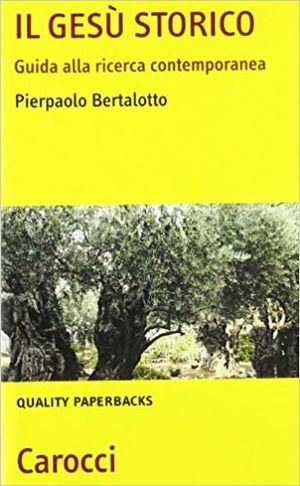Difference between revisions of "Il Gesù storico (2010 Bertalotto), book"
| (7 intermediate revisions by the same user not shown) | |||
| Line 1: | Line 1: | ||
[[File:2010 Bertalotto.jpg|thumb|300px]] | |||
''' Il Gesù storico ''' <Italian> / '''The Historical Jesus''' (2010) is a book by [[Pierpaolo Bertalotto]]. | ''' Il Gesù storico ''' <Italian> / '''The Historical Jesus''' (2010) is a book by [[Pierpaolo Bertalotto]]. | ||
| Line 51: | Line 51: | ||
[[Category:2010| Bertalotto]] | [[Category:2010| Bertalotto]] | ||
[[Category:Italian language--2010s|2010 Bertalotto]] | |||
[[Category:Italian language | |||
[[Category:Historical Jesus Studies--2010s|2010 Bertalotto]] | |||
[[Category:Historical Jesus Studies--Italian|2010 Bertalotto]] | |||
[[Category: | [[Category:Reception History--2010s|2010 Bertalotto]] | ||
[[Category:Reception History--Italian|2010 Bertalotto]] | |||
[[Category: | |||
[[Category:Jesus of | [[Category:Jesus Reception History (subject)|2010 Bertalotto]] | ||
[[Category:History of research (subject)|2010 Bertalotto]] | |||
Latest revision as of 20:21, 12 November 2019
Il Gesù storico <Italian> / The Historical Jesus (2010) is a book by Pierpaolo Bertalotto.
Abstract
The last thirty years have seen the growing of a new interest in the historical Jesus, which is now known among the scholars as the "Third Quest" after the Old and the New Quests. The main element of agreement among the contemporary researchers is the acknowledgment of Jesus' Jewishness, although the precise meaning of this concept is still strongly debated. This book critically presents some of the scholarly solutions that have become most popular even beyond the boundaries of the academia, among the many that have been recently proposed. A new perspective on the Christian and Jewish sources, strictly connected with those reconstructions centered on an enochic-apocalyptic interpretation of the figure of Jesus, is also offered.
"Da qualche anno a questa parte, anche sull'onda di alcuni successi editoriali (Dan Brown, Augias-Pesce...) stiamo assistendo a un moto d'interesse, non necessariamente accademico, per la figura di Gesù così come emerge dai dati storici. In questo volume Pierpaolo Bertalotto ricostruisce come questa ricerca si sia venuta configurando e ne ripercorre le tappe a partire dalla fine del XVIII secolo, individuandone alcuni dei principali filoni interpretativi (il "riformatore sociale", il "predicatore carismatico", il "rivoluzionario antiromano")."--Publisher description.
Editions and translations
Published in Rome, Italy: Carocci, 2010.
Table of contents
- Avvertenza
- Introduzione. Come procedere nella ricerca.
- I criteri di autenticità nella ricerca contemporanea
- Il contributo dell’archeologia
- Il riformatore sociale
- Il maestro sapienziale: Robert Funk e il Jesus Seminar
- Il filosofo cinico e l’asceta: John D. Crossan e Marcus Borg
- Gesù storico e movimento gesuano: Burton Mack e Mauro Pesce
- Il predicatore carismatico
- Lo Hasid: Geza Vermes
- Il mago: Morton Smith
- Il maestro della Legge: David Flusser
- Il rivoluzionario antiromano
- Il messia popolare: Richard Horsley
- Il re davidico: James Tabor
- Il presunto messia: Paula Fredriksen
- Gesù e l’apocalittica giudaica
- Il maestro apocalittico: Ed Sanders
- Il profeta millenarista: Bart Ehrman e Dale Allison
- Il giudeo marginale: John Meier
- Il messia enochico
- Il Figlio dell’uomo: Paolo Sacchi
- La riscoperta del giudaismo enochico: l’Enoch Seminar
- Gesù e l’ideologia enochico-essena
- L’origine del male
- Il ruolo della Legge mosaica
- La prospettiva escatologica
- Il Figlio dell’uomo
- Il giudizio
- Giovanni Battista, Gesù e Giacomo
- Gesù e il Battista
- I familiari di Gesù durante e dopo la sua predicazione
- Bibliografia
